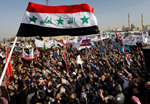 AFP: Campaigning for Iraq’s April 30 elections will be “highly divisive” as parties appeal to their sectarian bases at a time of worsening violence, the UN’s envoy to Baghdad has warned.
AFP: Campaigning for Iraq’s April 30 elections will be “highly divisive” as parties appeal to their sectarian bases at a time of worsening violence, the UN’s envoy to Baghdad has warned.

Baghdad – AFP – Campaigning for Iraq’s April 30 elections will be “highly divisive” as parties appeal to their sectarian bases at a time of worsening violence, the UN’s envoy to Baghdad has warned.
Nickolay Mladenov also pushed for Iraqi leaders to urgently pass a much-delayed annual budget within two weeks, noting that further postponing the spending bill would badly impact on drawing much-needed business and investment to the country.
His remarks came as campaigning officially began on Tuesday for the parliamentary polls, Iraq’s first since March 2010, with Prime Minister Nuri al-Maliki eyeing a third term with bloodshed at its highest level since the country emerged from a brutal sectarian war in 2008.
“Campaigning will be highly divisive,” Mladenov told AFP from his office in Baghdad’s heavily-fortified Green Zone complex, which is also home to parliament and the American and British embassies.
“Everyone is ratcheting it up to the maximum, and you could see this even before officially the campaign started.”
The former Bulgarian foreign and defence minister added: “I would hope that it would be more about issues, and how the country deals with its challenges, but at this point, it’s a lot about personality attacks.”
“The efforts to reach across the sectarian divide are very weak.”
He declined to name specific offenders, instead blaming “all the political parties” for the rhetoric.
Iraqis face a long list of daily struggles, ranging from lengthy power cuts and poor running water and sewerage to rampant corruption and high levels of unemployment, along with a seemingly endless stream of attacks.
But analysts have voiced worry that the polls could worsen already fragile communal ties in Iraq, where political parties typically conduct election campaigns by appealing to voters’ sectarian, ethnic or tribal background rather than on specific issues.
Violence has risen sharply in the past year, fuelling fears that Iraq is slipping back into the all-out communal conflict that plagued it in 2006 and 2007, leaving tens of thousands dead.
UN figures released on Tuesday put the overall toll for March at 592 dead, not including the conflict-hit desert province of Anbar, where militants have kept control of the town of Fallujah, a short drive from Baghdad, for nearly three months.
Mladenov also pushed for Iraqi lawmakers to quickly pass the annual budget, which has languished in parliament over a dispute between the central government and the autonomous Kurdish region.
As part of efforts to resolve the impasse, which centres around Kurdish efforts to export oil via Turkey, Kurdish authorities have agreed to start pumping 100,000 barrels of oil through pipelines controlled by Baghdad, though this has not yet started.
– Two-week window –
“I think the window closes in about two weeks,” Mladenov said of budget negotiations, because any longer would risk turning the spending bill into an election issue, which would likely further complicate the talks.
“What we are now working very intensely on is finding what is the possible compromise that would allow the budget to be approved by parliament, if possible before the election, or soon afterwards.”
He continued: “It’s a concern that if you wait for the deal after the elections, that deal, whatever the results of the election, will be delayed, and inevitably made more difficult.”
Asked what the impact would be if the budget were further delayed, or potentially not agreed this year, he replied: “It’s bad for the business climate, it’s unpredictable, it puts projects on hold, so from an investment perspective, you plan to do certain things and now you can’t pay for them.”
“It’s also bad from an accountability perspective.”
The tensions between Baghdad and Kurdish authorities in the northern city of Arbil have long been cited as among the biggest threats to Iraq’s long-term stability.
Along with the dispute over oil exports, Arbil wants to incorporate a vast swathe of territory stretching from Iran to Syria into its three-province autonomous region over the central government’s objections.


